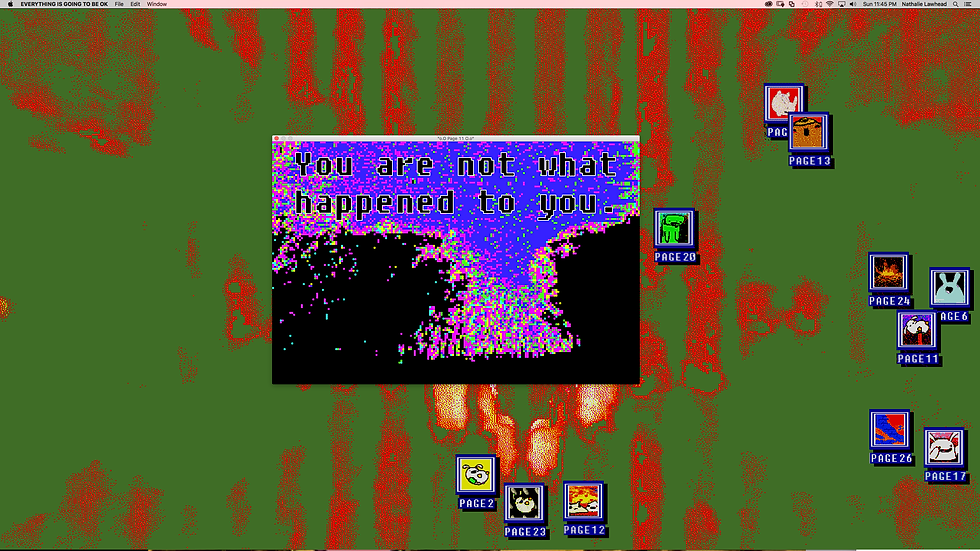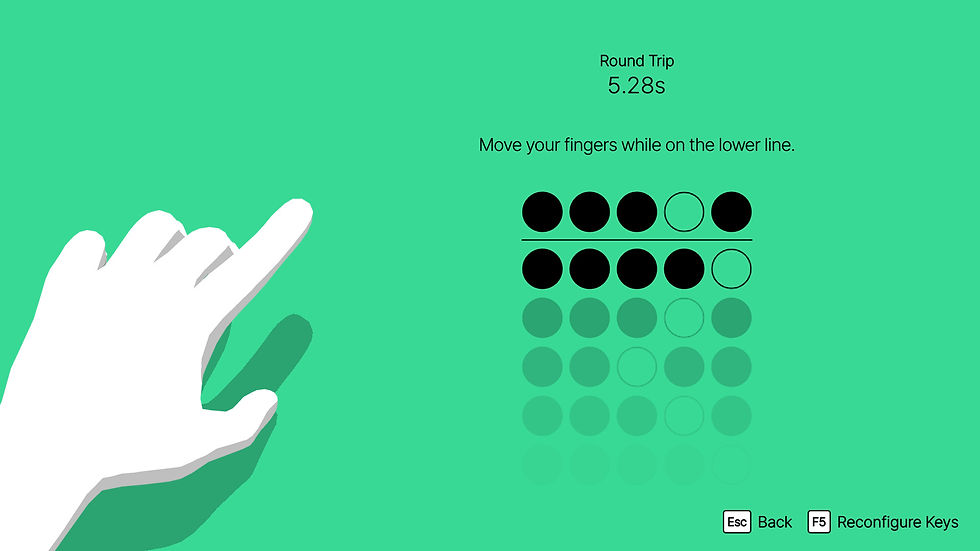OOI 2018 interview - "Everything is going to be OK"
- Out Of Index Festival

- 2018년 10월 18일
- 4분 분량
"Everything is going to be OK" by alienmelon
1) Please introduce yourself.
My name is alienmelon, or Nathalie Lawhead. I make experimental art games, and have been making things like this for over ten years. I started as a net-artist in the early 00's.
My work comes from a strongly experimental angle, exploring aspects of computer culture,
and computer art that I find interesting.
Many people say that what I make is "hard to describe", and something "you should see for yourself"...
so yeah. That's my work in a nutshell.
개발진이 궁금합니다. 1인 개발이라면 자신에 대해, 팀이라면 멤버와 개발 히스토리를 간단하게 소개해주세요.
제 이름은 에일리언멜론(alienmelon), 또는 나탈리 로헤드(Nathalie Lawhead)입니다.
10년 넘게 실험적인 아트 게임들을 만들어왔어요. 2000년 초에 넷-아티스트(net-artist)로서 첫 발을 뗐었네요.
그간의 게임들은 굉장히 실험적인 관점에서 만들었어요. 컴퓨터 문화와 아트에서 흥미로운 점을 발견했거든요.
많은 사람이 작품을 보고 ‘설명하기 힘들다’거나 ‘너 자신을 돌아보라’고 하는데, 뭐 그렇죠. 제 작품에 대한 명료한 설명이예요.
2) We wonder your first goal of this project. At the very first time in development, what was the key idea?
I wanted to talk about very difficult life experiences in an approachable way.
Kind of make light of the bad things that have happened, and create a space where you can laugh at it. There's a liberating quality about laughter, and this is something that I really wanted for this.
It's one of those projects that's been on my heart for a very long time.
In a way, making the art can be as healing, as experiencing the art.
프로젝트를 시작할 당시의 목표가 궁금합니다. 그리고 개발 초기 아이디어는 어떻게 얻었나요?
매우 어려운 삶의 경험을 접근하기 쉬운 방법으로 이야기해보고 싶었어요. 나쁜 것들의 순기능을 말하거나, 또는 그저 웃을 수 있는 공간을 만들어볼까 했었죠. 어디에도 얽매이지 않은 자유로운 웃음에 대해서 다루고자 했어요. 마음속에 오래 품어왔던 프로젝트 중 하나에요.
예술은 표현하는 것만으로 치유의 역할을 할 수 있다는 걸 보여주고 싶었죠.

3) Do you think your experiment is succeed? And tell us the reason why do you think that.
"Success" is a difficult thing to quantify. In terms of "a game" it is a spectacular failure. It's too experimental.
It's not a marketable "hit", and I'm not making a lot of money from it.
In terms of "art" it's a strong success. A lot of people have told me that it helped them through a hard time, helped them deal with suicide, helped "talk a friend off the ledge", and generally really touched them. In that regard, it is a success, and exactly what I wanted for it.
이번 실험이 성공했다고 생각하나요? 그리고 그렇게 판단하는 이유도 알려주세요.
‘성공’을 판단하는 게 참 어려워요. ‘게임’으로 본다면 아주 장대하게 실패했죠. 너무 모험적이었고, 상업적으로 성공하지 못했어요.
실제로 돈을 많이 벌지도 못했고요. 하지만 ‘예술’적으로는 크게 성공했다고 봐요.
많은 사람들이 힘든 시간을 이겨내는 데 도움이 됐다고 말했죠.
자살을 이겨내기도 하고, 친구를 설득하는 데 도움이 됐다는 이야기도 들었고요. 어쨌든, 전반적으로 ‘Everything is going to be OK’를 접한 사람들은 감명을 받은 듯해요. 제가 정확히 의도한 부분이고, 그래서 예술적인 성공을 거뒀다고 판단하고 있어요.
4) For many people, game is just a thing for fun. We know that your creation is struggling between 'video game' and 'digital art'. Could you tell us what is art, and what is game for you?
I struggle with the label "game" because it brings in all sorts of unnecessary baggage, and expectations. Gamers, the traditional consumer crowd, or the crowd that's coming from wanting to exploit games as a "consumer object only" (keeping it purely entertainment), find the stuff that I make relatively appalling. It upsets them because it's not "fun", or entertaining, in the standard way that you would expect from a game. They want goals, and a power fantasy. They want a mechanic that they can get good at, and eventually "win".
My work goes against a lot of that, or doesn't even incorporate it at all.
Work like mine rejects these things, and examines interacting with art in a lot of different ways that might not be entertaining to players.
"Game" is a difficult term to navigate when you enter the consumer spaces that feel entitled to protecting "the purity" of games. This is the area that I have the most trouble with, so I try to avoid the term "game" for my work.
When you say "digital art" a lot of that pressure goes away. I find it very freeing. I'm not opposed to "video game". I mean, I'm so happy about all the wonderful work being done to expand the label, and broaden the "video game" horizons, but at the same time this is a difficult sphere to navigate if you're doing things different.
Part of me really wants to consider "video game" and "digital art" as the same thing. There's no reason why they can't be, but for that to happen we really need to separate games from this "purely for entertainment" consumerist mindset.
많은 사람들이 게임은 ‘재미’를 위해서 한다고 말합니다. 그래서 ‘Everything is going to be Ok’의 정체성에 대한 논쟁도 발생했죠.
이 작품을 ‘비디오게임’으로 분류할지, ‘디지털 아트’로 볼지에 대해서요. 개인적으로 예술, 그리고 게임은 당신에게 무엇인지 궁금합니다.
이 작품을 ‘게임’으로 분류할지 논의하는 건 의미없다고 생각해요. 한편, 예상한 논란이기도 합니다. 전통적인 대중 게이머는 게임을 순수한 엔터테인먼트 콘텐츠로, 그리고 오로지 소비자를 위해 존재하는 상품으로 남기를 요구하죠. 전 좀 끔찍해요. 게임이 ‘재미’또는 여가를 위한 존재가 아닐 때 화를 내는 게요. 그들은 목표나 파워풀한 판타지를 원하죠. 그리고 게임을 ‘잘’하면 종단에는 이기게 되는 구조를 선호하고요. 제 작품은 거기서 동떨어져 있어요. 정확히 이야기하면 게임이 ‘그래야 한다’는 고정관념에 동의하지 않는다고 봐야겠네요. 제 작품들은 그런 관점에 반대해요. 게이머만을 위한 여가 콘텐츠가 아니어도 게임의 형태를 한 예술이 존재할 수 있다는 걸 실험하고 있죠.
‘게임’이라는 콘텐츠는 굉장히 방향을 잡기 어려워요. 소비자의 영역으로 발을 딛으면 기존 게임의 ‘순수성’을 논하면서 그 형태를 지키려 들죠. 굉장히 논쟁적인 영역이에요. 그래서 저는 ‘게임’이라는 형태로 제 작업을 국한시키고 싶지 않아요. ‘디지털 아트’라는 정체성을 제 작품에 부여하면 그런 압박에서 벗어나요. 비로소 자유를 찾는 거죠. 정리하자면 전 ‘비디오게임’이라는 형태에 반대하는 건 아니에요. 그러니까, 제 작품의 영역을 ‘비디오게임’ 지평까지 넓히는 건 환영이에요. 하지만 동시에 두 가지 영역을 분리해서 어느 한쪽을 선택하라고 한다면 어렵다는 거죠. 저는 ‘비디오게임’과 ‘디지털 아트’에서 같은 결을 느껴요. 어느 한 쪽이 아니라고 말할 수 없죠. 앞으로는 ‘순수한 재미를 위해’ 소비하는 사람들을 위한 게임과는 영역을 분리할 필요가 있을 듯해요.
[인터뷰 진행: 루크]








댓글